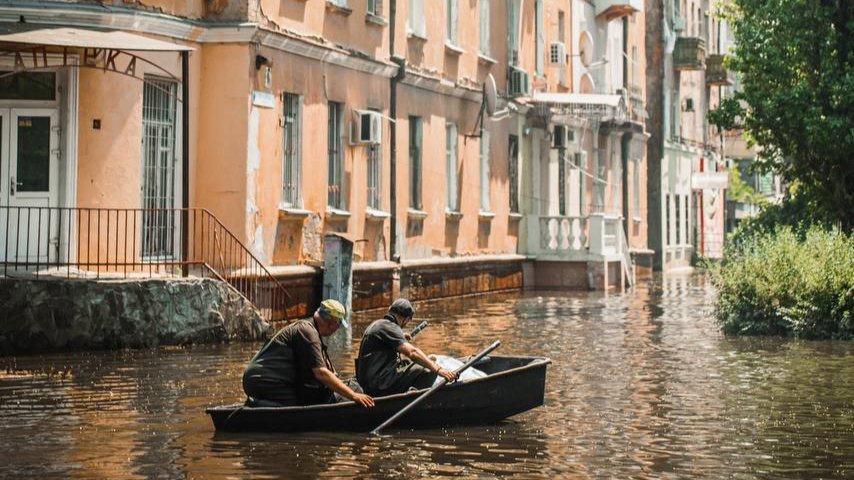Seven days of massive flooding in the Kherson region. The muddy torrent took with it the remains of houses, floundering animals, and… people. Lots of people! My neighbours, friends, and acquaintances from yesterday. News is scarce and sporadic — there’s no communication, no food, no water. But there is life, so it is important to keep telling the story of our heroes.
‘My hair turned grey almost completely’
Iryna, 44, unemployed, Hola Prystan, occupied by Russia
My children and I are now in a village that wasn’t affected by the flooding (the village will remain unnamed for safety reasons since Iryna is currently on occupied land — author’s note). Our friends had left the occupied territory at the beginning of the war and left us their keys for a rainy day. That day has now come. It’s a great arrangement: I have a whole room with a big sofa where the children and I all sleep together. We have food and drinking water, so we’ll live.
I hadn’t even seen myself in the mirror this week. Today I took a look, and my hair has turned grey almost completely. Russian “liberators” have turned our lives into hell. I hate them.
It’s our second year under the occupation, and every day is like the last. But at least before 6 June I had a home, and I could go inside, close the door, and imagine that there was no war, that my husband would soon be home from work and my children from school. For nearly 1.5 years, my children have been out of school. For nearly 1.5 years, I haven’t seen my husband, and my children haven’t seen their father. We’ve been deprived of everything. We are now homeless. Thousands of people have become homeless because of this damned Putin.
Good thing I’d thought to take the kids to my relatives who live at the highest point of the city. At first, we had planned to wait out the flood in the attic together, but the water started coming in too fast, and I got scared. I grabbed the children by the hand, and we hurried to our relatives. The farther we ran from our house, the less water there was, and the fear receded. It seemed that things would end quickly — that the water would hold for a while, the vegetable garden and the furniture in the house would suffer, but it would not be a disaster.
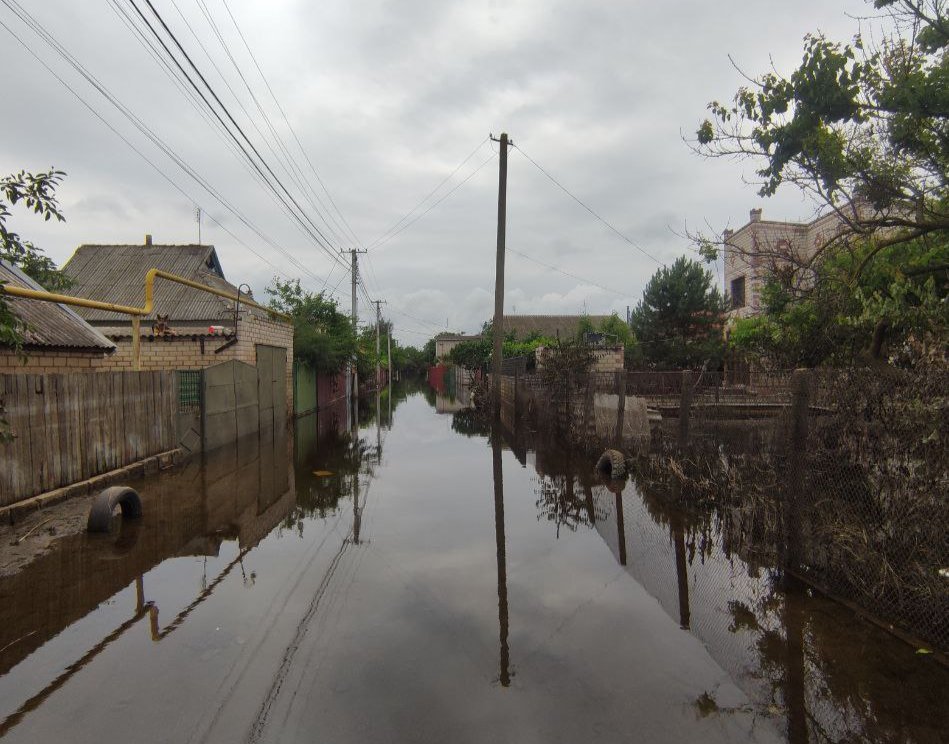
Right bank of the Dnipro River, Kherson, June 2023. Photo: Telegram
After leaving the children at our relatives’ place, I decided to go home because I was afraid the water would get to all the electronic gadgets. I was most worried about my computer and laptop. The water in my neighbourhood was already knee-deep. I started dragging the equipment up to the attic. I thought I would spend the night on the roof, then tomorrow the water would start receding, and I would take the kids home.
During the night, something terrible happened; the water started coming in much faster than during the day, the current intensified and brought mud and debris. I waited until dawn and saw that my house was flooded halfway up the windows. That’s when I knew that there was no way I could survive; soon the water would be in the attic as well. I went downstairs, where the water was up to my chest, and made my way to the exit from the yard. The current kept knocking me off my feet, and I slipped on the wet mud, fell a few times, but managed to get hold of something and get back up. Honestly, while I was wading through the water, I wasn’t sure I would survive.
When I reached the house where my children were, the water was two feet deep and all the furniture was flooded. For a few days, we were all crowded inside the attic. A week later, we reached land by boat and left for the village.
A relative of mine and his friends went around in a rowboat from the very first day, saving people from the roofs and taking them away to where there was less flooding. But not everyone was rescued. A granny on Fialkova Street kept banging on the window, already in the water. The men couldn’t reach her because of a gas pipe. There was water right up to the roof. As they were trying to get to her, the granny drowned.
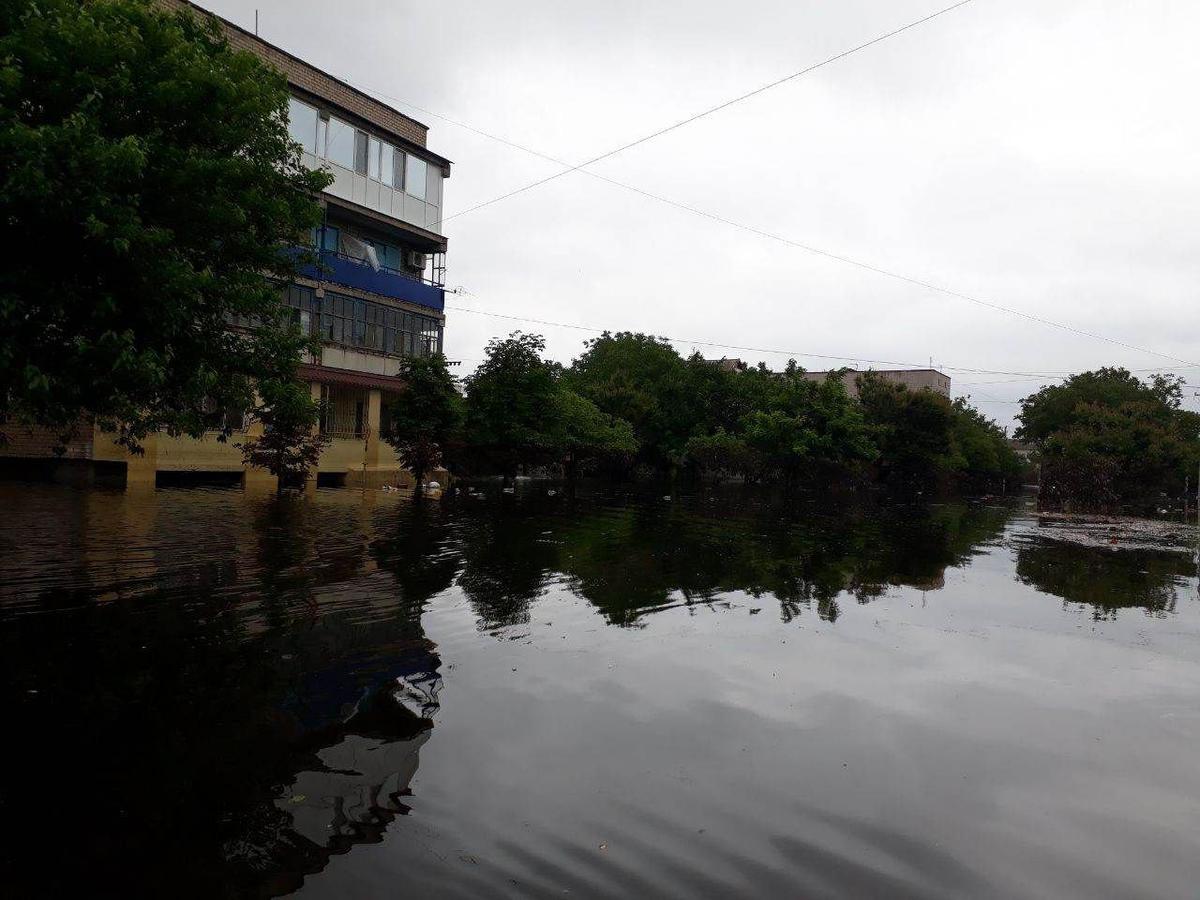
Right bank of the Dnipro River, Kherson, June 2023. Photo: Telegram
The water in Poliakov Street wasn’t as deep as in other areas. A young woman was trying to get across, carrying a year-old baby in her arms. The current knocked her off her feet and she lost hold of the child, who was swept away instantly. The body hasn’t yet been found.
A family that I knew who lived in 200 Years of Hola Prystan Street all drowned: the father, the mother, and the grandmother. On the first night, they kept writing into a local chat room, begging for help and saying that they were being severely flooded. People say volunteers in the area had even reached that street, but there were already too many people in their boat. In addition, almost everyone was rescuing their animals, which was partly why there wasn’t any space. After [the rescuers] took away the people with the cats and dogs, they came back for my acquaintances, but they had already gone from the roof. We thought someone else had taken them. But no — on the sixth day, their bodies were found right there, in the yard.
And the worst thing is that the shelling continued all the while that we were in our attics. And it continues still. On 8 June, a shell hit a group of people who were trying to evacuate. A 32-year-old pregnant woman was killed. She was trying to save her grandparents from the flooding when the shell hit her.
There are a lot of bodies in the city right now. It’s not clear what to do with them. We were told that nobody would take them away and that we would have to bury them in the yards. There is still water in some places, and the bodies of the drowned are still floating in their houses.
I saw a boat of the Russian emergency ministry, where brightly-dressed rescuers were posing for a journalist. Later, Russian TV channels will show how they worked and saved the people of our town. If they had done what they were supposed to do, there would have been fewer deaths. Many died because help didn’t come in time. People were sitting on the roofs, waiting for help, but the walls of the houses often eroded and collapsed.
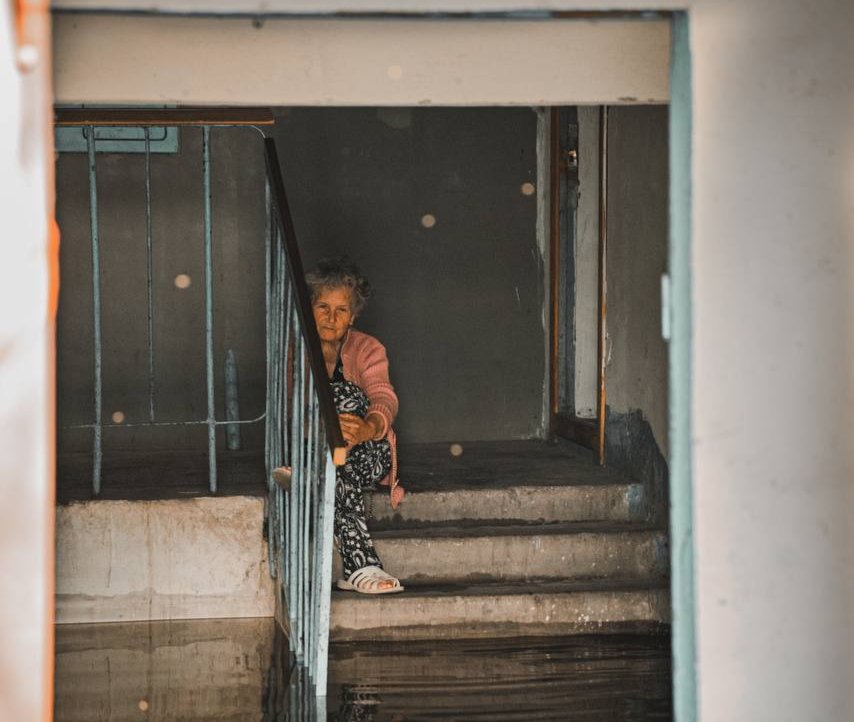
Right bank of the Dnipro River, Kherson, June 2023. Photo: Telegram
‘Our house is gone’
Victoria, 38, entrepreneur, Hola Prystan, occupied by Russia
You know what the worst thing is? They’re wiping us off the face of the earth. They’re killing our families and depriving us of our homes. But even this is not enough for the occupiers. Today, Russian soldiers are stripping the surviving houses of everything. In broad daylight, they drive up to our houses and rob and ransack…
My parents and I managed to get out of our house in time to move to my father’s flat in a multi-storey building. Our century-old house is gone — it has collapsed. Once the water is gone, the only thing left to do will be to drive a bulldozer through the yard and raze the ruins to the ground. Everything that we cherished, that was important to our family, has turned to debris.
A woman living nearby was able to drag her paralysed husband into the attic. When the water started to flood the roof, she managed to get out, but couldn’t save her husband.
In a local chat room, I saw a video of Grandpa Petro, one of the town’s old-timers, recounting that he and his wife tried to save themselves by climbing to their attic, but the ladder broke. She drowned, while he somehow managed to stay afloat. Then the house began to collapse, and Petro was swept away by the torrent. He held on to a small piece of styrofoam for more than a day. The rescuers didn’t see him because he was being carried along with rubbish and debris. He didn’t have the strength to call for help. He was spotted by volunteers who’d stopped to fix their boat which had broken down. They noticed a faint movement among the floating rubbish and pulled the old man into the boat. His physical and mental condition is terrible, and it’s unclear whether he will survive this calamity.
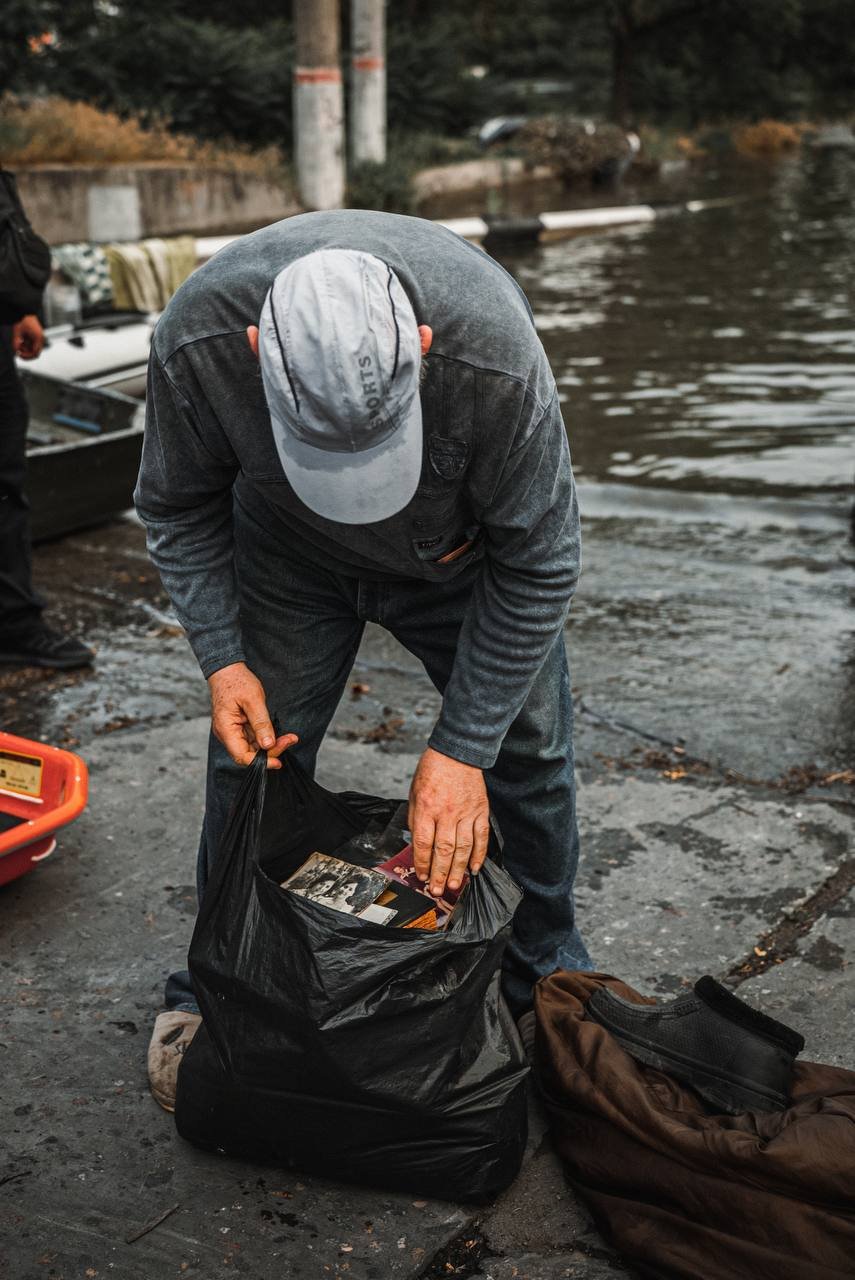
Right bank of the Dnipro River, Kherson, June 2023. Photo: Telegram
My parents had the time only to pick up the cats and dogs from our house. We also packed all the neighbours into the flat [where we are sheltering]. Mum didn’t even take any clothes, only the animals. She is now wearing my father’s clothes — the water didn’t go above the second storey and only flooded the floor of his flat. Dad found a gas cylinder in the shed and connected the stove to it. He doesn’t know how long the gas will last, but for now we’re able to cook porridge and pasta for our crowd. Our first-floor neighbours also live with us. Our cats and dogs, raised on special pet food, now have to eat what we do. There’s no electricity or water in the building yet. But we’ve stocked water into all containers found in the flat, and we’re consuming potable water extremely sparingly.
We’re not going anywhere — we’re waiting for the Ukrainian army. I understand there is a risk of being killed by shelling, but I hope that the [Ukrainian] offensive will not go through us, but advance directly to Crimea. Then the occupiers will run away from here by themselves. I understand that it’s a risk and it’s important to survive, but we simply don’t have the money to go anywhere. And how can we leave our animals? Taking all of them with us isn’t feasible. We’ll pray for our survival. The occupiers will leave and we’ll rebuild again.
‘Soon the interest, like the water, will wane’
Boris, 45, volunteer, Kherson, liberated by Ukraine
At the beginning of the occupation, my brother and I left Kherson for Kyiv. At first we didn’t want to leave, but Russian security forces came to our house. My elderly mother was watching something on her tablet, headphones on. Our “guests” knocked down the door, frightened her, and stripped the house of all electronic gadgets. So we left. We came back as soon as the city was liberated. There was shelling every day, but waiting it out somewhere else without doing any good was unbearable. We started volunteering to help out here and there.
When the floods started, my brother and I took out our boat, which we’d hidden from the Russians, and began to take people off the roofs. But on our side, unlike on the left bank, there were also rescuers getting people out.
So now we go out to catch cats and dogs and hand them over to animal care volunteers, who have created a database where people can find their pets.
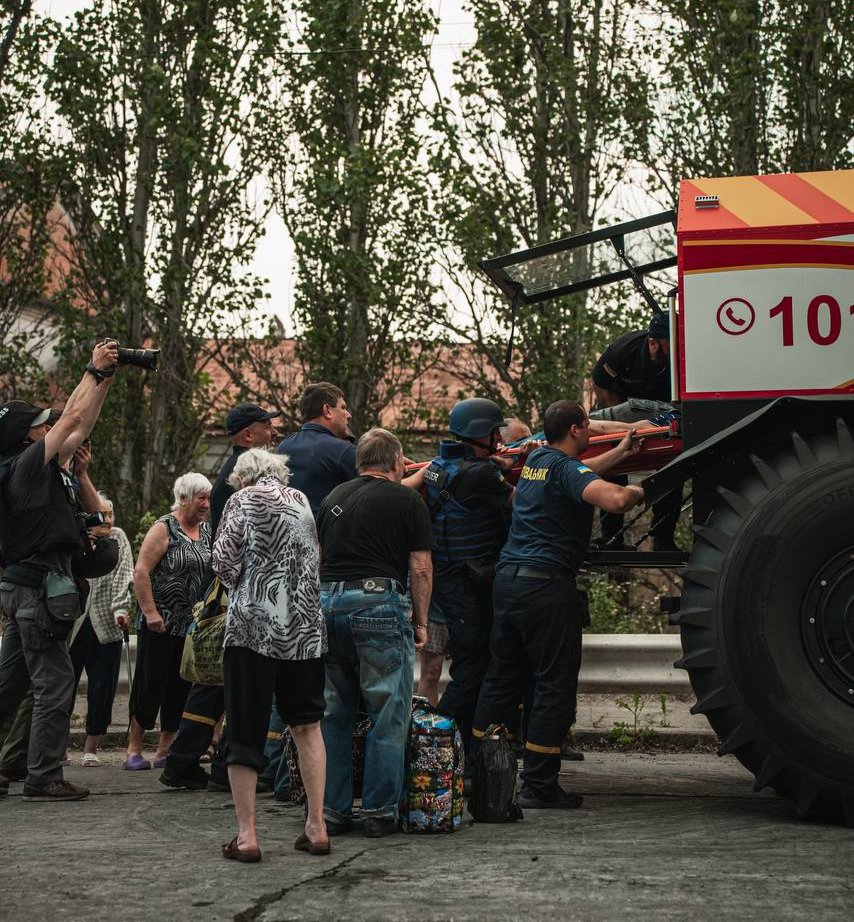
Right bank of the Dnipro River, Kherson, June 2023. Photo: Telegram
If a cat or dog is sitting in a tree, we paddle up and use a net to get them off. It’s more difficult if they’re on a roof: they’re afraid of us and won’t let us near them. Then we at least leave them some food.
A lot of humanitarian aid has been brought to Kherson, both for people and animals. We’re stocking up on food. There is a lot of help while throngs of foreign journalists are here and the local authorities can pose in front of the sunken houses. But soon the interest, like the water, will wane. What will we feed these unfortunate animals then? We are stocking up to be able to provide for them for a while longer after all the visitors leave.
When we found out about the hell that was happening on the left bank, my brother and I decided to sneak past Bilohrudyy Island to Hola Prystan to get at least a few people out of there. Almost immediately, machine guns started firing at us and we had to turn around. I feel sorry for the people there — they’re left without any help at all.
Join us in rebuilding Novaya Gazeta Europe
The Russian government has banned independent media. We were forced to leave our country in order to keep doing our job, telling our readers about what is going on Russia, Ukraine and Europe.
We will continue fighting against warfare and dictatorship. We believe that freedom of speech is the most efficient antidote against tyranny. Support us financially to help us fight for peace and freedom.
By clicking the Support button, you agree to the processing of your personal data.
To cancel a regular donation, please write to [email protected]
